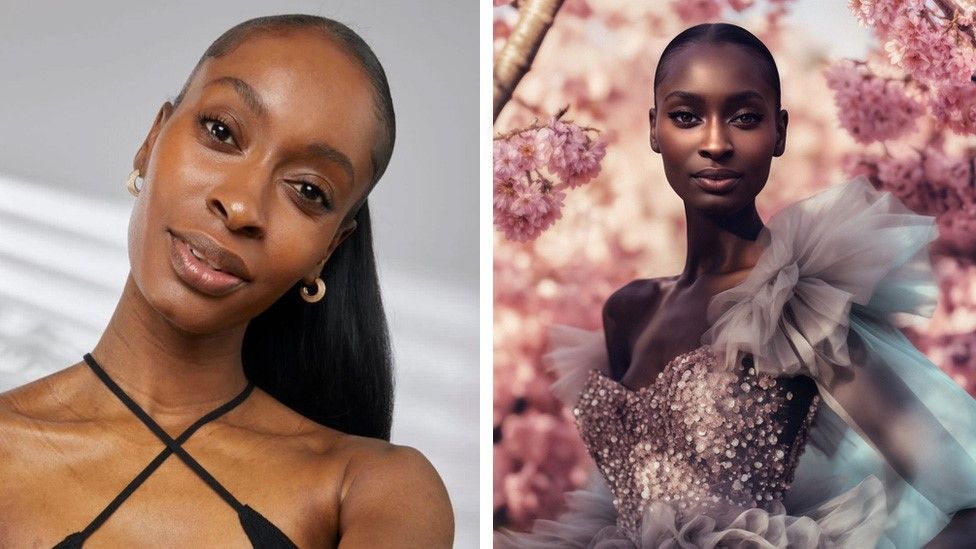ARTICLE AD BOX
 Image source, Alexsandrah/The Diigitals
Image source, Alexsandrah/The Diigitals
Model Alexsandrah (left) says her AI twin (right) can do jobs that she can't get to
By Sam Gruet
Business & technology reporter
Alexsandrah never really wanted to be a model.
First scouted when she was 13, and then again as a young adult, she turned down those initial two opportunities. But then she finally decided to give it a go.
"What have you got to lose? Just see how it goes," she told herself.
Now full time in the industry, the London-based model is taking another chance in her career, by creating a virtual, AI-generated version of herself.
She hopes it will secure her future in modelling.
"Having an AI version of you kind of keeps you safe," she explains.
"I will benefit from it because it's literally an AI version of me, I'm not cut out from anything. All the proceeds, if any proceeds are made, will be coming to me.
"You don't have to travel, you don't have to do the airport runs, you don't have to do anything. It gives people an opportunity to also just live their lives and do other things, and be in two places at the same time," she adds.
Alexsandrah says she is one of the first to market a virtual version of herself to clients, in an industry that has become one of the latest to keep a watchful, over-the-shoulder eye at the growth of AI.
Nearly three quarters of the fashion executives in a survey published by management consultancy McKinsey in November last year, said AI was a priority for their companies in 2024. More than a quarter said they already used it in creative design and development.
Behind Alexsandrah's virtual twin is Cameron Wilson, founder and chief executive of AI and 3D modelling agency The Diigitals.
The company found its first taste of global success with the 2017 launch of Shudu, marketed as the world's first digital supermodel. Now counting 250,000 people among her Instagram followers, Shudu - a virtual influencer - has fronted campaigns for Balenciaga, Lexus and Balmain, but not without criticism.
Image source, The Diigitals
Image caption,Shudu, the world's first "digital supermodel" was created by Cameron Wilson
"At the time that I created Shudu, it created a huge amount of comment about how a white person could create a black virtual character," Mr Wilson explains. "So when that happened, it really made me think about creating these characters in ethical ways, and the implications of it in the future."
The online backlash has shaped his latest work with Alexsandrah, who is paid to have her image used in any campaigns or photoshoots her AI twin appears in.
"We're trying to show, businesses, brands, magazines that they can still use AI and real models together, to encourage the fair use of AI rather than the doom and gloom of jobs being taken away," he says.
The protection of jobs is something groups representing those in the industry - models, makeup artists and hairstylists - want to see too.
Equity, which represents fashion models in the UK, tells the BBC it is lobbying the UK government bring in laws to strengthen the rights of performers.
"We encourage our members not to sign away their rights, and ensure that their image is only used based on fair pay and fair conditions of usage," says a spokesperson for the group..
Meanwhile, the British Fashion Model Agents Association urges caution against the growth of AI. "We are not burying our heads in the sand, AI is coming and the industry needs to be prepared and to adapt its business model to reflect this," says its director John Horner.
The perceived threat of AI to the fashion industry came to a head last year after fashion brand Levi's announced it would be using AI to generate models of more diverse body types and skin tones to increase representation of its product models.
Anger from within the modelling world followed, with accusations of laziness levelled at the brand, and some online describing the technology as "perpetuating racism". Levi's backtracked and said it was "committed to using AI technologies equitably and transparently".
Image source, The Diigitals
Image caption,Alexsandrah's AI twin, left, and Shudu pose for a virtual selfie
Josephine Markham Webster, the boss of Mentor Models agency in Sheffield, was of those to voice anger at the time, and thinks AI generated models are a step backward for the industry.
"All this work has been done over the last few years with diversity, with representing women and men of different body shapes, different sizes, different looks," she says. "AI versions of models are taking away from that. It's a backwards move.
"It's going back to using the ideal standard of a model. It's not a real dress size. It's not real skin. It's not real beauty. And I think it's going to be damaging to the people who are modelling."
But there's no denying that demand for virtual models and influencers is growing.
In October last year, Facebook and Instagram owner Meta announced its latest attempt to merge the real and virtual worlds by introducing of a team of AI chatbots - modelled on celebrities including Snoop Dogg, Kendall Jenner and Bear Grylls.
Some reports suggest the celebrities are being paid as much as $5m (£3.96m) for their likeness.
Image source, The Diigitals
Image caption,Kami is the world's first virtual influencer with Down's Syndrome
"Brands are really looking for characters that can can exist on social media and really engage their audience, often to bring awareness to certain things," says Mr Wilson.
One of his latest clients was the charity Down's Syndrome International.
"We worked with them to create the world's first virtual influencer with Down's Syndrome; Kami. Along with over 100 different women from the Down's Syndrome community," he explains.
"When we try to create characters we're looking at it from an ethical perspective. How do we bring awareness to the space? How do we impact this space for the better?"

 10 months ago
25
10 months ago
25








 English (US) ·
English (US) ·